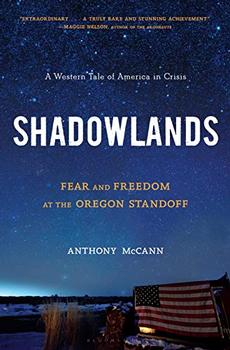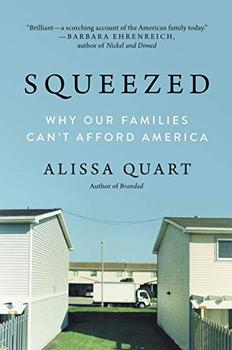Summary | Excerpt | Reviews | Beyond the book | Read-Alikes | Genres & Themes | Author Bio

An Inner History of the New America
by George PackerIn The Unwinding: An Inner History of the New America, George Packer looks at the current state of the US – the decline of our economy, the effects of technological advancements on both industry and individuals, our failing political system, the rise of certain superstars – and how we got here.
What makes this book so unique is the way Packer presents his information. Rather than providing a singular history from an omniscient point of view (as you might expect), he summarizes the life story of a handful of people over multiple chapters: Dean Price, a born-again entrepreneur who helps popularize biofuel in the US; Tammy Thomas, an African American factory worker struggling to raise her family in impoverished Ohio; Peter Thiel, a Silicon Valley billionaire and co-founder of PayPal; and Jeff Connaughton, an idealistic Washington lobbyist who packs it in and pens The Payoff: Why Wall Street Always Wins. Packer shows how the changing times shaped their decisions and actions, and contextualizes really well. He provides family histories, looking back generations to their parents and grandparents, and he explores their personal fears and motivations. He also gives shorter glimpses into the lives of highly influential Americans – Newt Gingrich, Raymond Carver, Oprah Winfrey, Elizabeth Warren, Jay-Z, Sam Walton, to name a few.
From the very beginning, it's clear that Packer conducted extensive research for this project. (He provides an abridged bibliography, which is very useful. In particular, I enjoyed looking at the online companion to his chapter openings, which are collages of headlines, advertisements, pop culture references, and songs from a given year). Working with this quantity of material couldn't have been easy, and Packer is able to capture and summarize the information with great craftsmanship. Though very different, his characters' stories echo each other in subtle ways, and it's fascinating to see what ingenuity, determination, fear, greed, and freedom can produce across different socio-economic classes.
However, the author's journalistic style – reporting facts but not commenting on or analyzing what happens – was somewhat disappointing. I was hoping to get more of his professional assessment, to have his reflections act as the thread that holds everything together. He doesn't explain so much as observe, and at times I felt excluded from the conversation. I think a lot of readers will be interested in this book because they're looking to make sense of this chaotic, often frustrating time in our country's history, and they are trying to understand something about their own lives – how they relate to the "new America" - but (outside of the two-page prologue) I didn't get that from the material he presented. I also felt like the title wasn't entirely appropriate. Packer doesn't over-idealize the past; his book doesn't imply that all was once good in the United States or that it's terrible now. His work highlights the organic, simultaneous growth and deterioration of this country and its people. The title, however, hints at the opposite, that what is now "unwinding" was once "wound," that the "new America" is a static and unchanging product of history, rather than a simultaneously evolving and devolving country.
Overall, George Packer's The Unwinding takes an ingenious approach to interpreting today's America. His way of considering the whole via its parts is intimate and insightful, and he allows readers to watch the events of the last 30 years unfold like a science experiment. Though I don't feel that I walked away with a deeper understanding of my place in this "unwinding," Packer has given me plenty to think about. Without being dogmatic or overly depressing (though I wouldn't call the end result optimistic), the author tells the story of people who are, in many ways, different as different can be, but he also highlights their sense of the American spirit. He writes:
"Each decline brought renewal, each implosion released energy, out of each unwinding came a new cohesion. The unwinding brings freedom, more than the world has ever granted, and to more kinds of people than ever before – freedom to go away, freedom to return, freedom to change your story, get your facts, get hired, get fired, get high, marry, divorce, go broke, begin again, start a business, have it both ways, take it to the limit, walk away from the ruins, succeed beyond your dreams and boast about it, fail abjectly and try again."
For an interview with George Packer on The Daily Show, please click video below:
![]() This review
first ran in the July 10, 2013
issue of BookBrowse Recommends.
This review
first ran in the July 10, 2013
issue of BookBrowse Recommends.

If you liked The Unwinding, try these:

by Anthony McCann
Published 2019
An "epic exploration" of the 2016 right-wing Oregon Occupation - "an excellent microcosm by which we might better understand our difficult national history and distressing political moment" (Maggie Nelson).

by Alissa Quart
Published 2019
Families today are squeezed on every side - from high childcare costs and harsh employment policies to workplaces without paid family leave or even dependable and regular working hours. Many realize that attaining the standard of living their parents managed has become impossible.
Your guide toexceptional books
BookBrowse seeks out and recommends the best in contemporary fiction and nonfiction—books that not only engage and entertain but also deepen our understanding of ourselves and the world around us.